Analysis of Hospitality Industry Research Articles
VerifiedAdded on 2020/10/22
|16
|5449
|364
AI Summary
This assignment requires students to analyze a collection of research articles related to the hospitality industry. The articles cover various topics such as leader-member exchange, transformational leadership, employee job satisfaction, and service-leadership competencies. Students are expected to provide a meta title, meta description, and summary in JSON format. The summary should include specific details about the assignment, including the type of research articles provided and the required output format.
Contribute Materials
Your contribution can guide someone’s learning journey. Share your
documents today.
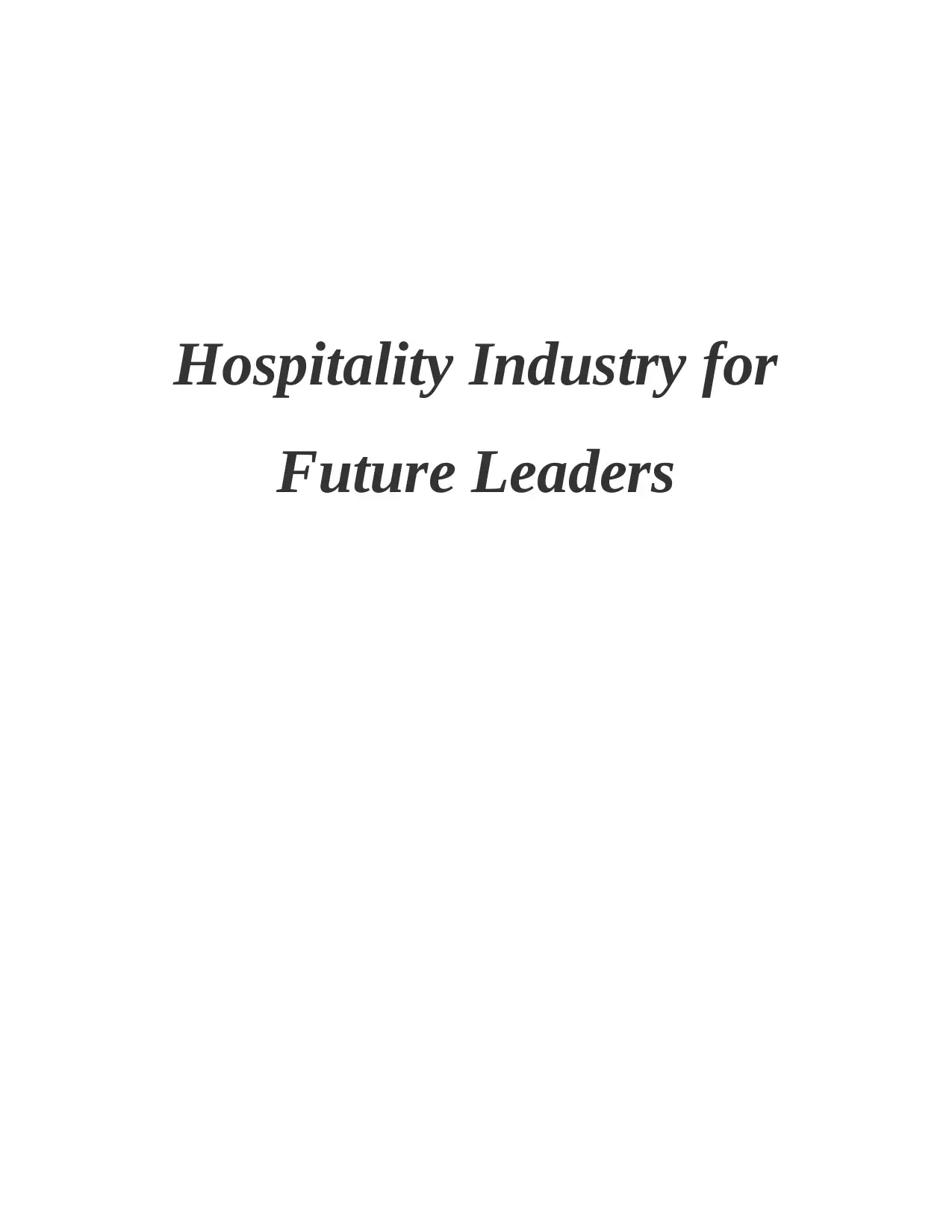
Hospitality Industry for
Future Leaders
Future Leaders
Secure Best Marks with AI Grader
Need help grading? Try our AI Grader for instant feedback on your assignments.
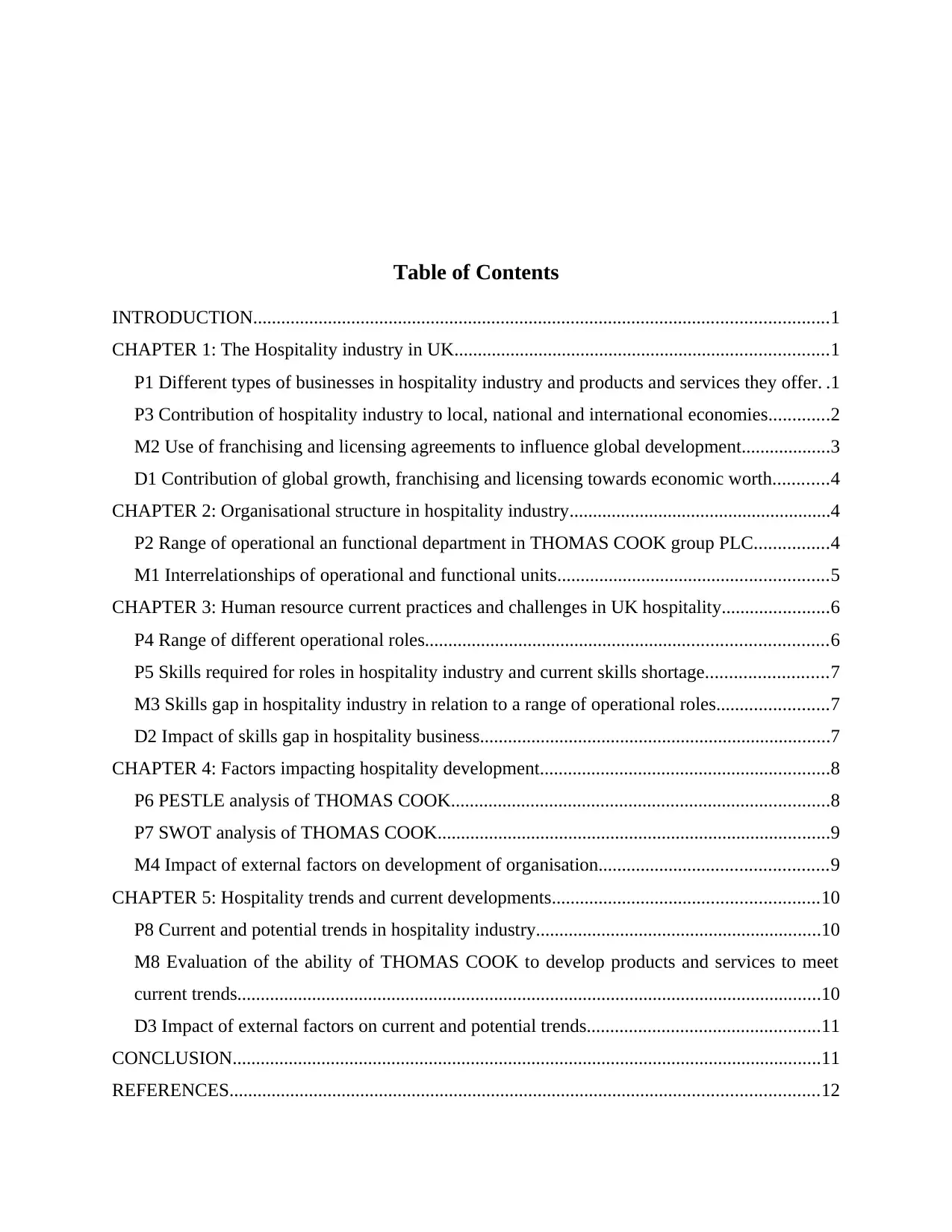
Table of Contents
INTRODUCTION...........................................................................................................................1
CHAPTER 1: The Hospitality industry in UK................................................................................1
P1 Different types of businesses in hospitality industry and products and services they offer. .1
P3 Contribution of hospitality industry to local, national and international economies.............2
M2 Use of franchising and licensing agreements to influence global development...................3
D1 Contribution of global growth, franchising and licensing towards economic worth............4
CHAPTER 2: Organisational structure in hospitality industry........................................................4
P2 Range of operational an functional department in THOMAS COOK group PLC................4
M1 Interrelationships of operational and functional units..........................................................5
CHAPTER 3: Human resource current practices and challenges in UK hospitality.......................6
P4 Range of different operational roles......................................................................................6
P5 Skills required for roles in hospitality industry and current skills shortage..........................7
M3 Skills gap in hospitality industry in relation to a range of operational roles........................7
D2 Impact of skills gap in hospitality business...........................................................................7
CHAPTER 4: Factors impacting hospitality development..............................................................8
P6 PESTLE analysis of THOMAS COOK.................................................................................8
P7 SWOT analysis of THOMAS COOK....................................................................................9
M4 Impact of external factors on development of organisation.................................................9
CHAPTER 5: Hospitality trends and current developments.........................................................10
P8 Current and potential trends in hospitality industry.............................................................10
M8 Evaluation of the ability of THOMAS COOK to develop products and services to meet
current trends.............................................................................................................................10
D3 Impact of external factors on current and potential trends..................................................11
CONCLUSION..............................................................................................................................11
REFERENCES..............................................................................................................................12
INTRODUCTION...........................................................................................................................1
CHAPTER 1: The Hospitality industry in UK................................................................................1
P1 Different types of businesses in hospitality industry and products and services they offer. .1
P3 Contribution of hospitality industry to local, national and international economies.............2
M2 Use of franchising and licensing agreements to influence global development...................3
D1 Contribution of global growth, franchising and licensing towards economic worth............4
CHAPTER 2: Organisational structure in hospitality industry........................................................4
P2 Range of operational an functional department in THOMAS COOK group PLC................4
M1 Interrelationships of operational and functional units..........................................................5
CHAPTER 3: Human resource current practices and challenges in UK hospitality.......................6
P4 Range of different operational roles......................................................................................6
P5 Skills required for roles in hospitality industry and current skills shortage..........................7
M3 Skills gap in hospitality industry in relation to a range of operational roles........................7
D2 Impact of skills gap in hospitality business...........................................................................7
CHAPTER 4: Factors impacting hospitality development..............................................................8
P6 PESTLE analysis of THOMAS COOK.................................................................................8
P7 SWOT analysis of THOMAS COOK....................................................................................9
M4 Impact of external factors on development of organisation.................................................9
CHAPTER 5: Hospitality trends and current developments.........................................................10
P8 Current and potential trends in hospitality industry.............................................................10
M8 Evaluation of the ability of THOMAS COOK to develop products and services to meet
current trends.............................................................................................................................10
D3 Impact of external factors on current and potential trends..................................................11
CONCLUSION..............................................................................................................................11
REFERENCES..............................................................................................................................12

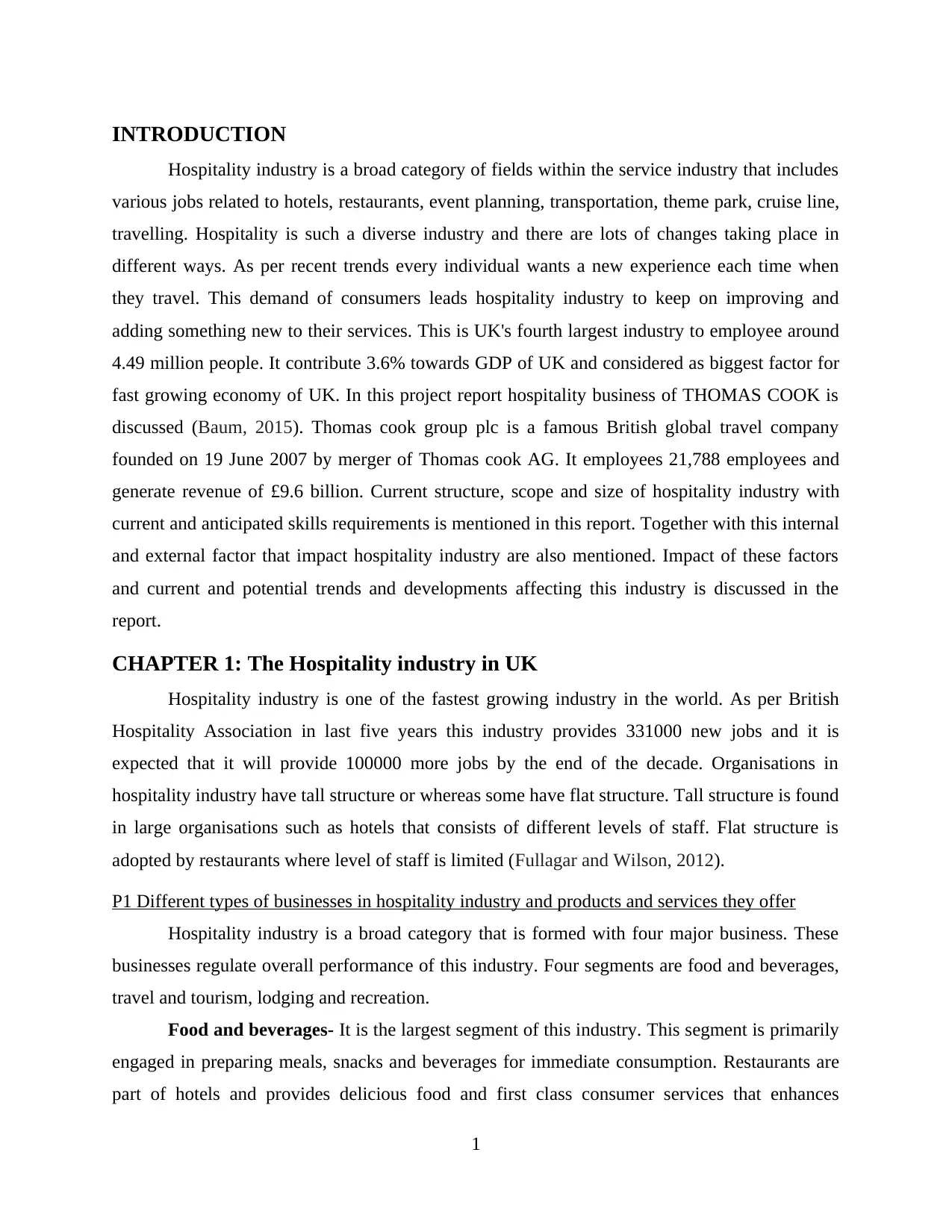
INTRODUCTION
Hospitality industry is a broad category of fields within the service industry that includes
various jobs related to hotels, restaurants, event planning, transportation, theme park, cruise line,
travelling. Hospitality is such a diverse industry and there are lots of changes taking place in
different ways. As per recent trends every individual wants a new experience each time when
they travel. This demand of consumers leads hospitality industry to keep on improving and
adding something new to their services. This is UK's fourth largest industry to employee around
4.49 million people. It contribute 3.6% towards GDP of UK and considered as biggest factor for
fast growing economy of UK. In this project report hospitality business of THOMAS COOK is
discussed (Baum, 2015). Thomas cook group plc is a famous British global travel company
founded on 19 June 2007 by merger of Thomas cook AG. It employees 21,788 employees and
generate revenue of £9.6 billion. Current structure, scope and size of hospitality industry with
current and anticipated skills requirements is mentioned in this report. Together with this internal
and external factor that impact hospitality industry are also mentioned. Impact of these factors
and current and potential trends and developments affecting this industry is discussed in the
report.
CHAPTER 1: The Hospitality industry in UK
Hospitality industry is one of the fastest growing industry in the world. As per British
Hospitality Association in last five years this industry provides 331000 new jobs and it is
expected that it will provide 100000 more jobs by the end of the decade. Organisations in
hospitality industry have tall structure or whereas some have flat structure. Tall structure is found
in large organisations such as hotels that consists of different levels of staff. Flat structure is
adopted by restaurants where level of staff is limited (Fullagar and Wilson, 2012).
P1 Different types of businesses in hospitality industry and products and services they offer
Hospitality industry is a broad category that is formed with four major business. These
businesses regulate overall performance of this industry. Four segments are food and beverages,
travel and tourism, lodging and recreation.
Food and beverages- It is the largest segment of this industry. This segment is primarily
engaged in preparing meals, snacks and beverages for immediate consumption. Restaurants are
part of hotels and provides delicious food and first class consumer services that enhances
1
Hospitality industry is a broad category of fields within the service industry that includes
various jobs related to hotels, restaurants, event planning, transportation, theme park, cruise line,
travelling. Hospitality is such a diverse industry and there are lots of changes taking place in
different ways. As per recent trends every individual wants a new experience each time when
they travel. This demand of consumers leads hospitality industry to keep on improving and
adding something new to their services. This is UK's fourth largest industry to employee around
4.49 million people. It contribute 3.6% towards GDP of UK and considered as biggest factor for
fast growing economy of UK. In this project report hospitality business of THOMAS COOK is
discussed (Baum, 2015). Thomas cook group plc is a famous British global travel company
founded on 19 June 2007 by merger of Thomas cook AG. It employees 21,788 employees and
generate revenue of £9.6 billion. Current structure, scope and size of hospitality industry with
current and anticipated skills requirements is mentioned in this report. Together with this internal
and external factor that impact hospitality industry are also mentioned. Impact of these factors
and current and potential trends and developments affecting this industry is discussed in the
report.
CHAPTER 1: The Hospitality industry in UK
Hospitality industry is one of the fastest growing industry in the world. As per British
Hospitality Association in last five years this industry provides 331000 new jobs and it is
expected that it will provide 100000 more jobs by the end of the decade. Organisations in
hospitality industry have tall structure or whereas some have flat structure. Tall structure is found
in large organisations such as hotels that consists of different levels of staff. Flat structure is
adopted by restaurants where level of staff is limited (Fullagar and Wilson, 2012).
P1 Different types of businesses in hospitality industry and products and services they offer
Hospitality industry is a broad category that is formed with four major business. These
businesses regulate overall performance of this industry. Four segments are food and beverages,
travel and tourism, lodging and recreation.
Food and beverages- It is the largest segment of this industry. This segment is primarily
engaged in preparing meals, snacks and beverages for immediate consumption. Restaurants are
part of hotels and provides delicious food and first class consumer services that enhances
1
Paraphrase This Document
Need a fresh take? Get an instant paraphrase of this document with our AI Paraphraser
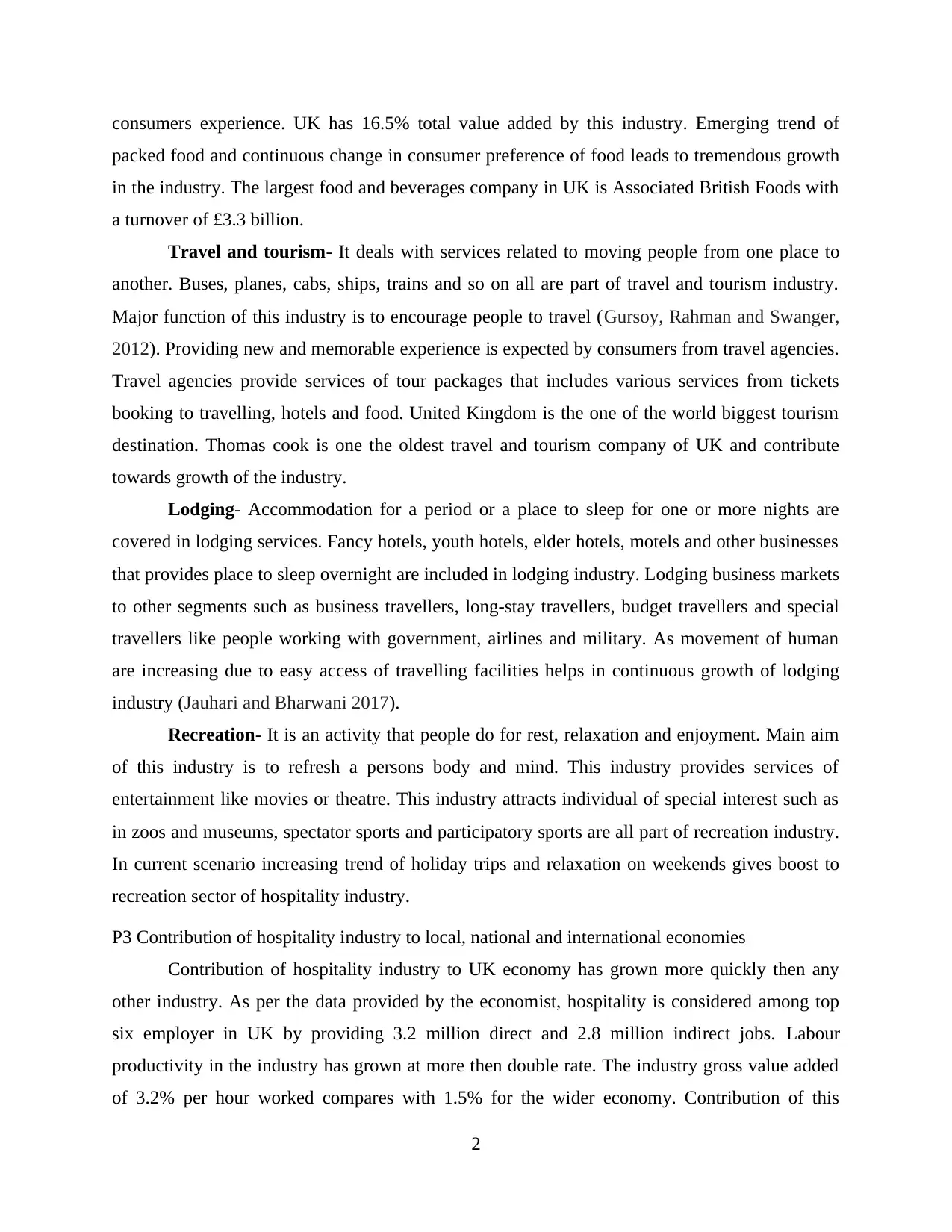
consumers experience. UK has 16.5% total value added by this industry. Emerging trend of
packed food and continuous change in consumer preference of food leads to tremendous growth
in the industry. The largest food and beverages company in UK is Associated British Foods with
a turnover of £3.3 billion.
Travel and tourism- It deals with services related to moving people from one place to
another. Buses, planes, cabs, ships, trains and so on all are part of travel and tourism industry.
Major function of this industry is to encourage people to travel (Gursoy, Rahman and Swanger,
2012). Providing new and memorable experience is expected by consumers from travel agencies.
Travel agencies provide services of tour packages that includes various services from tickets
booking to travelling, hotels and food. United Kingdom is the one of the world biggest tourism
destination. Thomas cook is one the oldest travel and tourism company of UK and contribute
towards growth of the industry.
Lodging- Accommodation for a period or a place to sleep for one or more nights are
covered in lodging services. Fancy hotels, youth hotels, elder hotels, motels and other businesses
that provides place to sleep overnight are included in lodging industry. Lodging business markets
to other segments such as business travellers, long-stay travellers, budget travellers and special
travellers like people working with government, airlines and military. As movement of human
are increasing due to easy access of travelling facilities helps in continuous growth of lodging
industry (Jauhari and Bharwani 2017).
Recreation- It is an activity that people do for rest, relaxation and enjoyment. Main aim
of this industry is to refresh a persons body and mind. This industry provides services of
entertainment like movies or theatre. This industry attracts individual of special interest such as
in zoos and museums, spectator sports and participatory sports are all part of recreation industry.
In current scenario increasing trend of holiday trips and relaxation on weekends gives boost to
recreation sector of hospitality industry.
P3 Contribution of hospitality industry to local, national and international economies
Contribution of hospitality industry to UK economy has grown more quickly then any
other industry. As per the data provided by the economist, hospitality is considered among top
six employer in UK by providing 3.2 million direct and 2.8 million indirect jobs. Labour
productivity in the industry has grown at more then double rate. The industry gross value added
of 3.2% per hour worked compares with 1.5% for the wider economy. Contribution of this
2
packed food and continuous change in consumer preference of food leads to tremendous growth
in the industry. The largest food and beverages company in UK is Associated British Foods with
a turnover of £3.3 billion.
Travel and tourism- It deals with services related to moving people from one place to
another. Buses, planes, cabs, ships, trains and so on all are part of travel and tourism industry.
Major function of this industry is to encourage people to travel (Gursoy, Rahman and Swanger,
2012). Providing new and memorable experience is expected by consumers from travel agencies.
Travel agencies provide services of tour packages that includes various services from tickets
booking to travelling, hotels and food. United Kingdom is the one of the world biggest tourism
destination. Thomas cook is one the oldest travel and tourism company of UK and contribute
towards growth of the industry.
Lodging- Accommodation for a period or a place to sleep for one or more nights are
covered in lodging services. Fancy hotels, youth hotels, elder hotels, motels and other businesses
that provides place to sleep overnight are included in lodging industry. Lodging business markets
to other segments such as business travellers, long-stay travellers, budget travellers and special
travellers like people working with government, airlines and military. As movement of human
are increasing due to easy access of travelling facilities helps in continuous growth of lodging
industry (Jauhari and Bharwani 2017).
Recreation- It is an activity that people do for rest, relaxation and enjoyment. Main aim
of this industry is to refresh a persons body and mind. This industry provides services of
entertainment like movies or theatre. This industry attracts individual of special interest such as
in zoos and museums, spectator sports and participatory sports are all part of recreation industry.
In current scenario increasing trend of holiday trips and relaxation on weekends gives boost to
recreation sector of hospitality industry.
P3 Contribution of hospitality industry to local, national and international economies
Contribution of hospitality industry to UK economy has grown more quickly then any
other industry. As per the data provided by the economist, hospitality is considered among top
six employer in UK by providing 3.2 million direct and 2.8 million indirect jobs. Labour
productivity in the industry has grown at more then double rate. The industry gross value added
of 3.2% per hour worked compares with 1.5% for the wider economy. Contribution of this
2
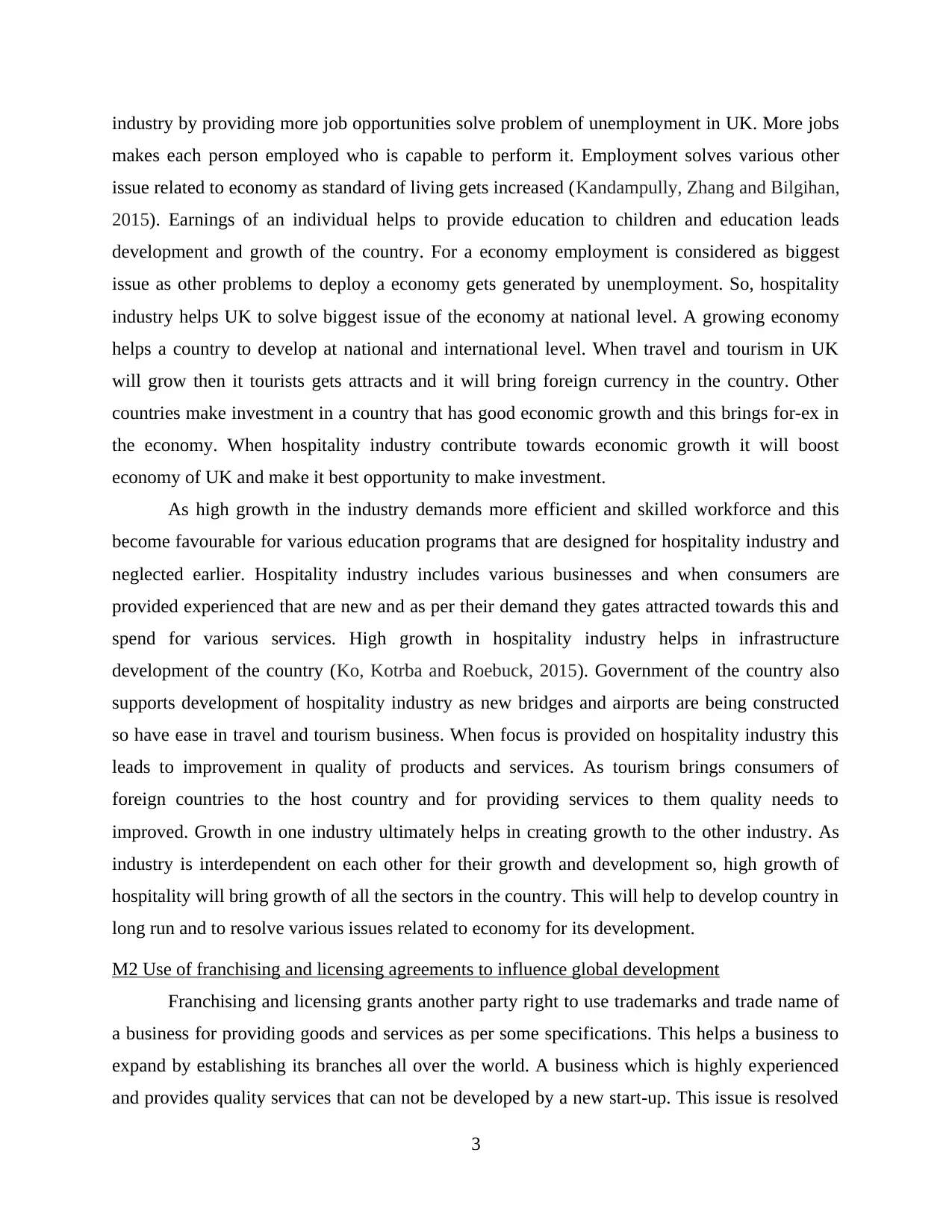
industry by providing more job opportunities solve problem of unemployment in UK. More jobs
makes each person employed who is capable to perform it. Employment solves various other
issue related to economy as standard of living gets increased (Kandampully, Zhang and Bilgihan,
2015). Earnings of an individual helps to provide education to children and education leads
development and growth of the country. For a economy employment is considered as biggest
issue as other problems to deploy a economy gets generated by unemployment. So, hospitality
industry helps UK to solve biggest issue of the economy at national level. A growing economy
helps a country to develop at national and international level. When travel and tourism in UK
will grow then it tourists gets attracts and it will bring foreign currency in the country. Other
countries make investment in a country that has good economic growth and this brings for-ex in
the economy. When hospitality industry contribute towards economic growth it will boost
economy of UK and make it best opportunity to make investment.
As high growth in the industry demands more efficient and skilled workforce and this
become favourable for various education programs that are designed for hospitality industry and
neglected earlier. Hospitality industry includes various businesses and when consumers are
provided experienced that are new and as per their demand they gates attracted towards this and
spend for various services. High growth in hospitality industry helps in infrastructure
development of the country (Ko, Kotrba and Roebuck, 2015). Government of the country also
supports development of hospitality industry as new bridges and airports are being constructed
so have ease in travel and tourism business. When focus is provided on hospitality industry this
leads to improvement in quality of products and services. As tourism brings consumers of
foreign countries to the host country and for providing services to them quality needs to
improved. Growth in one industry ultimately helps in creating growth to the other industry. As
industry is interdependent on each other for their growth and development so, high growth of
hospitality will bring growth of all the sectors in the country. This will help to develop country in
long run and to resolve various issues related to economy for its development.
M2 Use of franchising and licensing agreements to influence global development
Franchising and licensing grants another party right to use trademarks and trade name of
a business for providing goods and services as per some specifications. This helps a business to
expand by establishing its branches all over the world. A business which is highly experienced
and provides quality services that can not be developed by a new start-up. This issue is resolved
3
makes each person employed who is capable to perform it. Employment solves various other
issue related to economy as standard of living gets increased (Kandampully, Zhang and Bilgihan,
2015). Earnings of an individual helps to provide education to children and education leads
development and growth of the country. For a economy employment is considered as biggest
issue as other problems to deploy a economy gets generated by unemployment. So, hospitality
industry helps UK to solve biggest issue of the economy at national level. A growing economy
helps a country to develop at national and international level. When travel and tourism in UK
will grow then it tourists gets attracts and it will bring foreign currency in the country. Other
countries make investment in a country that has good economic growth and this brings for-ex in
the economy. When hospitality industry contribute towards economic growth it will boost
economy of UK and make it best opportunity to make investment.
As high growth in the industry demands more efficient and skilled workforce and this
become favourable for various education programs that are designed for hospitality industry and
neglected earlier. Hospitality industry includes various businesses and when consumers are
provided experienced that are new and as per their demand they gates attracted towards this and
spend for various services. High growth in hospitality industry helps in infrastructure
development of the country (Ko, Kotrba and Roebuck, 2015). Government of the country also
supports development of hospitality industry as new bridges and airports are being constructed
so have ease in travel and tourism business. When focus is provided on hospitality industry this
leads to improvement in quality of products and services. As tourism brings consumers of
foreign countries to the host country and for providing services to them quality needs to
improved. Growth in one industry ultimately helps in creating growth to the other industry. As
industry is interdependent on each other for their growth and development so, high growth of
hospitality will bring growth of all the sectors in the country. This will help to develop country in
long run and to resolve various issues related to economy for its development.
M2 Use of franchising and licensing agreements to influence global development
Franchising and licensing grants another party right to use trademarks and trade name of
a business for providing goods and services as per some specifications. This helps a business to
expand by establishing its branches all over the world. A business which is highly experienced
and provides quality services that can not be developed by a new start-up. This issue is resolved
3
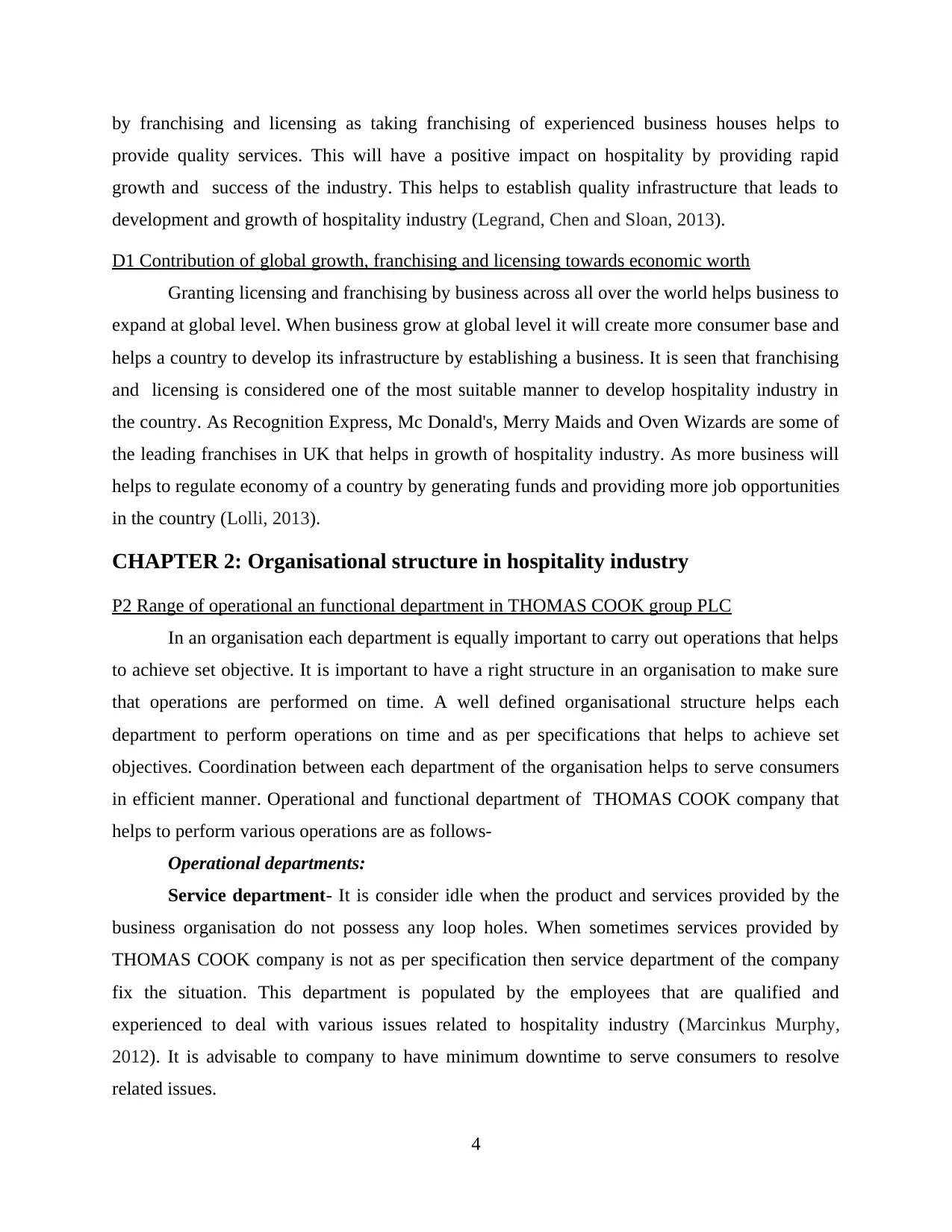
by franchising and licensing as taking franchising of experienced business houses helps to
provide quality services. This will have a positive impact on hospitality by providing rapid
growth and success of the industry. This helps to establish quality infrastructure that leads to
development and growth of hospitality industry (Legrand, Chen and Sloan, 2013).
D1 Contribution of global growth, franchising and licensing towards economic worth
Granting licensing and franchising by business across all over the world helps business to
expand at global level. When business grow at global level it will create more consumer base and
helps a country to develop its infrastructure by establishing a business. It is seen that franchising
and licensing is considered one of the most suitable manner to develop hospitality industry in
the country. As Recognition Express, Mc Donald's, Merry Maids and Oven Wizards are some of
the leading franchises in UK that helps in growth of hospitality industry. As more business will
helps to regulate economy of a country by generating funds and providing more job opportunities
in the country (Lolli, 2013).
CHAPTER 2: Organisational structure in hospitality industry
P2 Range of operational an functional department in THOMAS COOK group PLC
In an organisation each department is equally important to carry out operations that helps
to achieve set objective. It is important to have a right structure in an organisation to make sure
that operations are performed on time. A well defined organisational structure helps each
department to perform operations on time and as per specifications that helps to achieve set
objectives. Coordination between each department of the organisation helps to serve consumers
in efficient manner. Operational and functional department of THOMAS COOK company that
helps to perform various operations are as follows-
Operational departments:
Service department- It is consider idle when the product and services provided by the
business organisation do not possess any loop holes. When sometimes services provided by
THOMAS COOK company is not as per specification then service department of the company
fix the situation. This department is populated by the employees that are qualified and
experienced to deal with various issues related to hospitality industry (Marcinkus Murphy,
2012). It is advisable to company to have minimum downtime to serve consumers to resolve
related issues.
4
provide quality services. This will have a positive impact on hospitality by providing rapid
growth and success of the industry. This helps to establish quality infrastructure that leads to
development and growth of hospitality industry (Legrand, Chen and Sloan, 2013).
D1 Contribution of global growth, franchising and licensing towards economic worth
Granting licensing and franchising by business across all over the world helps business to
expand at global level. When business grow at global level it will create more consumer base and
helps a country to develop its infrastructure by establishing a business. It is seen that franchising
and licensing is considered one of the most suitable manner to develop hospitality industry in
the country. As Recognition Express, Mc Donald's, Merry Maids and Oven Wizards are some of
the leading franchises in UK that helps in growth of hospitality industry. As more business will
helps to regulate economy of a country by generating funds and providing more job opportunities
in the country (Lolli, 2013).
CHAPTER 2: Organisational structure in hospitality industry
P2 Range of operational an functional department in THOMAS COOK group PLC
In an organisation each department is equally important to carry out operations that helps
to achieve set objective. It is important to have a right structure in an organisation to make sure
that operations are performed on time. A well defined organisational structure helps each
department to perform operations on time and as per specifications that helps to achieve set
objectives. Coordination between each department of the organisation helps to serve consumers
in efficient manner. Operational and functional department of THOMAS COOK company that
helps to perform various operations are as follows-
Operational departments:
Service department- It is consider idle when the product and services provided by the
business organisation do not possess any loop holes. When sometimes services provided by
THOMAS COOK company is not as per specification then service department of the company
fix the situation. This department is populated by the employees that are qualified and
experienced to deal with various issues related to hospitality industry (Marcinkus Murphy,
2012). It is advisable to company to have minimum downtime to serve consumers to resolve
related issues.
4
Secure Best Marks with AI Grader
Need help grading? Try our AI Grader for instant feedback on your assignments.
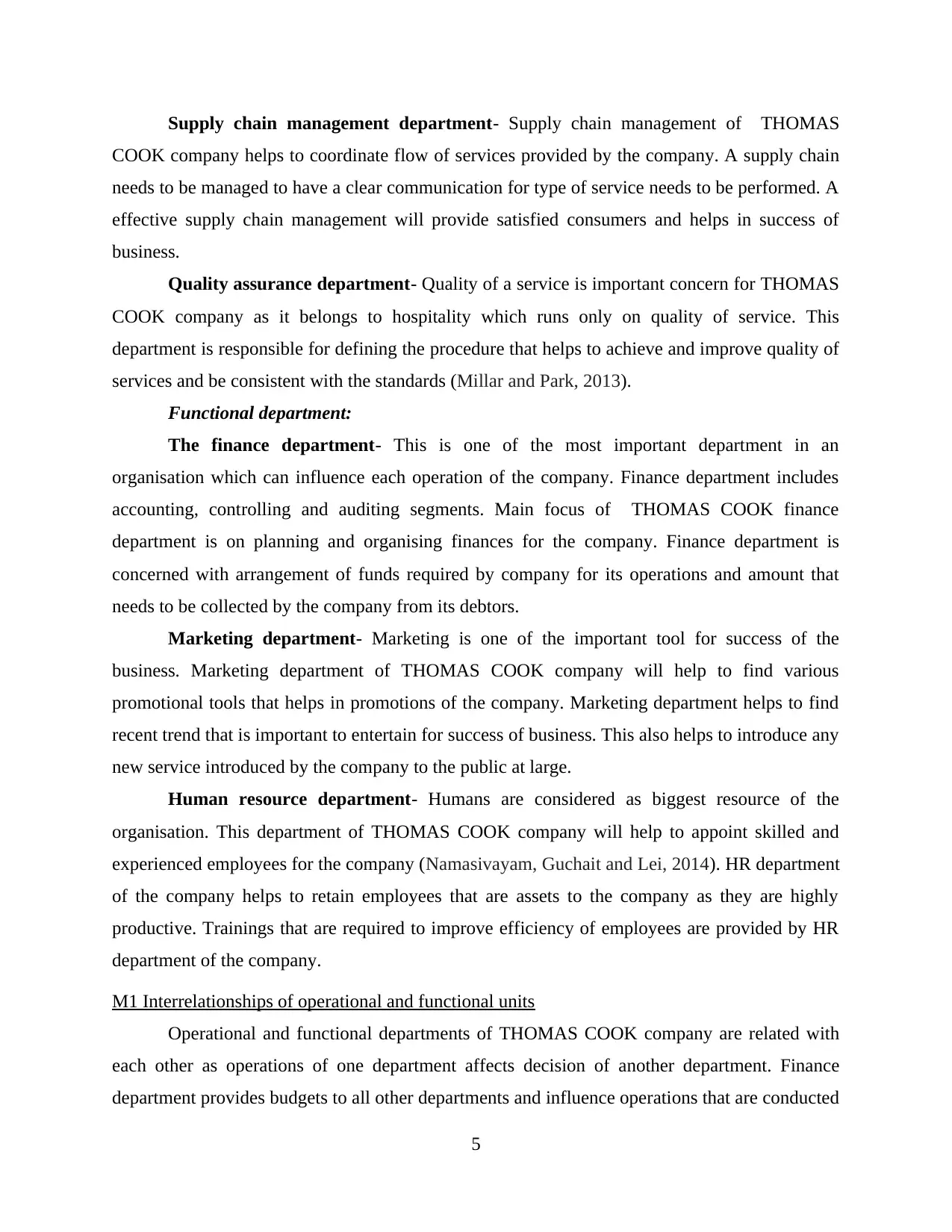
Supply chain management department- Supply chain management of THOMAS
COOK company helps to coordinate flow of services provided by the company. A supply chain
needs to be managed to have a clear communication for type of service needs to be performed. A
effective supply chain management will provide satisfied consumers and helps in success of
business.
Quality assurance department- Quality of a service is important concern for THOMAS
COOK company as it belongs to hospitality which runs only on quality of service. This
department is responsible for defining the procedure that helps to achieve and improve quality of
services and be consistent with the standards (Millar and Park, 2013).
Functional department:
The finance department- This is one of the most important department in an
organisation which can influence each operation of the company. Finance department includes
accounting, controlling and auditing segments. Main focus of THOMAS COOK finance
department is on planning and organising finances for the company. Finance department is
concerned with arrangement of funds required by company for its operations and amount that
needs to be collected by the company from its debtors.
Marketing department- Marketing is one of the important tool for success of the
business. Marketing department of THOMAS COOK company will help to find various
promotional tools that helps in promotions of the company. Marketing department helps to find
recent trend that is important to entertain for success of business. This also helps to introduce any
new service introduced by the company to the public at large.
Human resource department- Humans are considered as biggest resource of the
organisation. This department of THOMAS COOK company will help to appoint skilled and
experienced employees for the company (Namasivayam, Guchait and Lei, 2014). HR department
of the company helps to retain employees that are assets to the company as they are highly
productive. Trainings that are required to improve efficiency of employees are provided by HR
department of the company.
M1 Interrelationships of operational and functional units
Operational and functional departments of THOMAS COOK company are related with
each other as operations of one department affects decision of another department. Finance
department provides budgets to all other departments and influence operations that are conducted
5
COOK company helps to coordinate flow of services provided by the company. A supply chain
needs to be managed to have a clear communication for type of service needs to be performed. A
effective supply chain management will provide satisfied consumers and helps in success of
business.
Quality assurance department- Quality of a service is important concern for THOMAS
COOK company as it belongs to hospitality which runs only on quality of service. This
department is responsible for defining the procedure that helps to achieve and improve quality of
services and be consistent with the standards (Millar and Park, 2013).
Functional department:
The finance department- This is one of the most important department in an
organisation which can influence each operation of the company. Finance department includes
accounting, controlling and auditing segments. Main focus of THOMAS COOK finance
department is on planning and organising finances for the company. Finance department is
concerned with arrangement of funds required by company for its operations and amount that
needs to be collected by the company from its debtors.
Marketing department- Marketing is one of the important tool for success of the
business. Marketing department of THOMAS COOK company will help to find various
promotional tools that helps in promotions of the company. Marketing department helps to find
recent trend that is important to entertain for success of business. This also helps to introduce any
new service introduced by the company to the public at large.
Human resource department- Humans are considered as biggest resource of the
organisation. This department of THOMAS COOK company will help to appoint skilled and
experienced employees for the company (Namasivayam, Guchait and Lei, 2014). HR department
of the company helps to retain employees that are assets to the company as they are highly
productive. Trainings that are required to improve efficiency of employees are provided by HR
department of the company.
M1 Interrelationships of operational and functional units
Operational and functional departments of THOMAS COOK company are related with
each other as operations of one department affects decision of another department. Finance
department provides budgets to all other departments and influence operations that are conducted
5
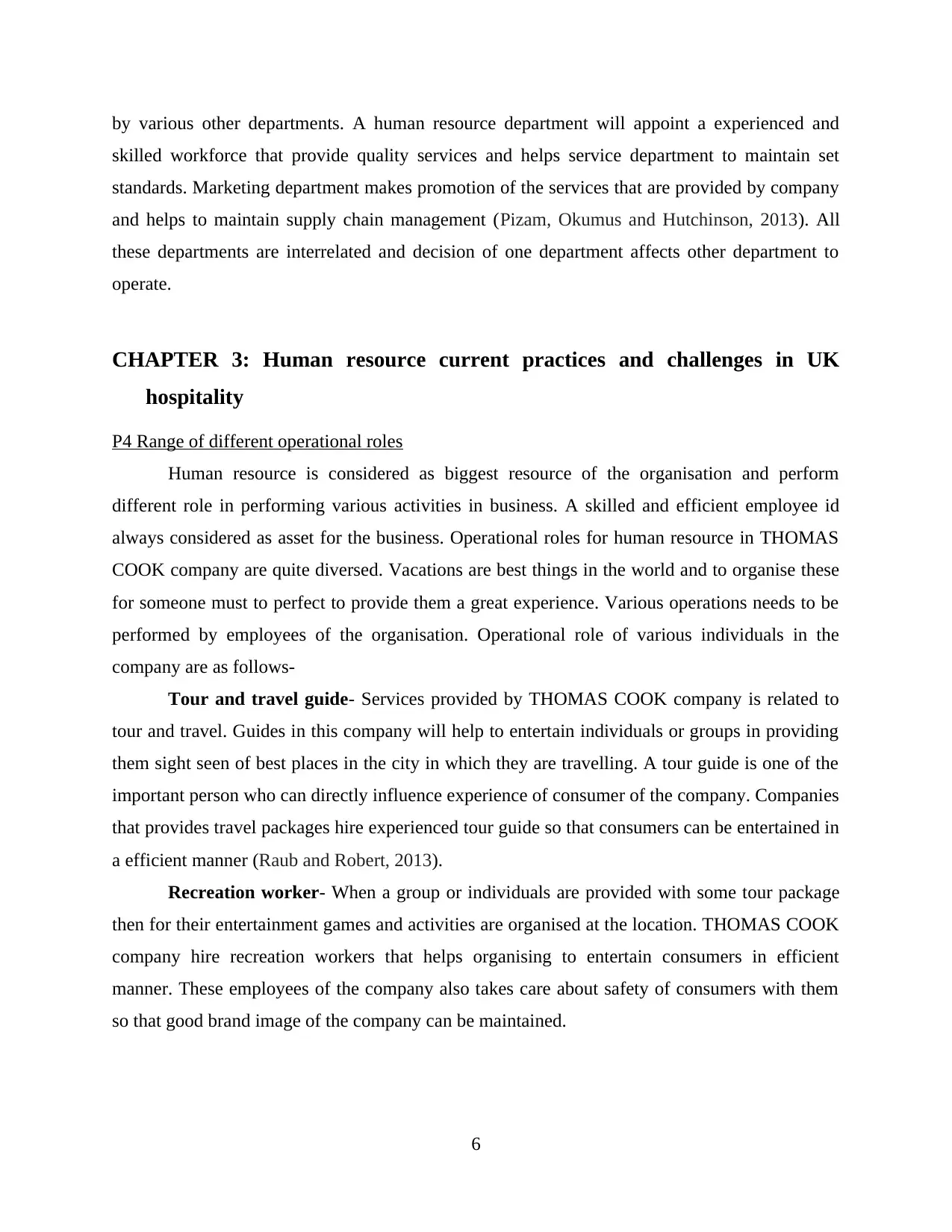
by various other departments. A human resource department will appoint a experienced and
skilled workforce that provide quality services and helps service department to maintain set
standards. Marketing department makes promotion of the services that are provided by company
and helps to maintain supply chain management (Pizam, Okumus and Hutchinson, 2013). All
these departments are interrelated and decision of one department affects other department to
operate.
CHAPTER 3: Human resource current practices and challenges in UK
hospitality
P4 Range of different operational roles
Human resource is considered as biggest resource of the organisation and perform
different role in performing various activities in business. A skilled and efficient employee id
always considered as asset for the business. Operational roles for human resource in THOMAS
COOK company are quite diversed. Vacations are best things in the world and to organise these
for someone must to perfect to provide them a great experience. Various operations needs to be
performed by employees of the organisation. Operational role of various individuals in the
company are as follows-
Tour and travel guide- Services provided by THOMAS COOK company is related to
tour and travel. Guides in this company will help to entertain individuals or groups in providing
them sight seen of best places in the city in which they are travelling. A tour guide is one of the
important person who can directly influence experience of consumer of the company. Companies
that provides travel packages hire experienced tour guide so that consumers can be entertained in
a efficient manner (Raub and Robert, 2013).
Recreation worker- When a group or individuals are provided with some tour package
then for their entertainment games and activities are organised at the location. THOMAS COOK
company hire recreation workers that helps organising to entertain consumers in efficient
manner. These employees of the company also takes care about safety of consumers with them
so that good brand image of the company can be maintained.
6
skilled workforce that provide quality services and helps service department to maintain set
standards. Marketing department makes promotion of the services that are provided by company
and helps to maintain supply chain management (Pizam, Okumus and Hutchinson, 2013). All
these departments are interrelated and decision of one department affects other department to
operate.
CHAPTER 3: Human resource current practices and challenges in UK
hospitality
P4 Range of different operational roles
Human resource is considered as biggest resource of the organisation and perform
different role in performing various activities in business. A skilled and efficient employee id
always considered as asset for the business. Operational roles for human resource in THOMAS
COOK company are quite diversed. Vacations are best things in the world and to organise these
for someone must to perfect to provide them a great experience. Various operations needs to be
performed by employees of the organisation. Operational role of various individuals in the
company are as follows-
Tour and travel guide- Services provided by THOMAS COOK company is related to
tour and travel. Guides in this company will help to entertain individuals or groups in providing
them sight seen of best places in the city in which they are travelling. A tour guide is one of the
important person who can directly influence experience of consumer of the company. Companies
that provides travel packages hire experienced tour guide so that consumers can be entertained in
a efficient manner (Raub and Robert, 2013).
Recreation worker- When a group or individuals are provided with some tour package
then for their entertainment games and activities are organised at the location. THOMAS COOK
company hire recreation workers that helps organising to entertain consumers in efficient
manner. These employees of the company also takes care about safety of consumers with them
so that good brand image of the company can be maintained.
6
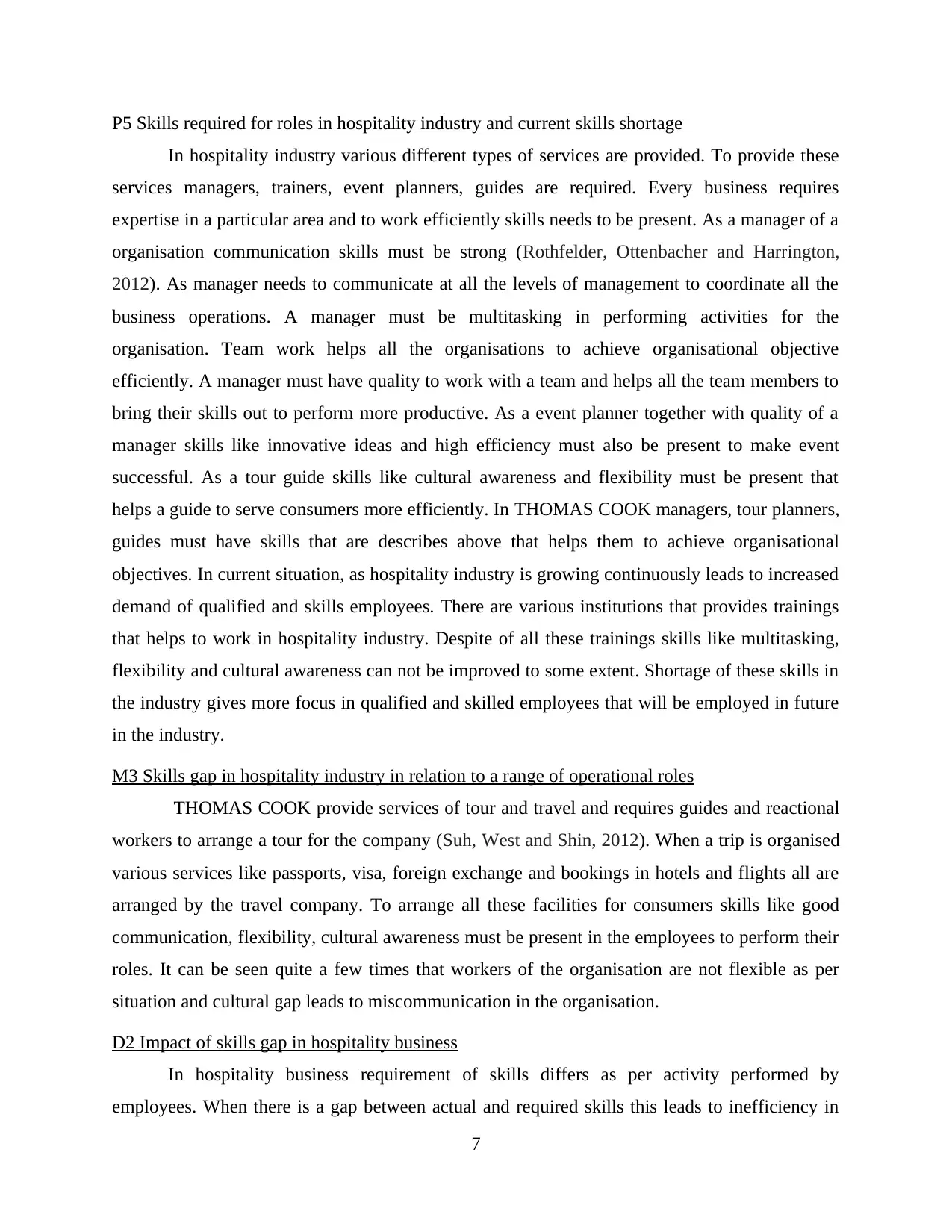
P5 Skills required for roles in hospitality industry and current skills shortage
In hospitality industry various different types of services are provided. To provide these
services managers, trainers, event planners, guides are required. Every business requires
expertise in a particular area and to work efficiently skills needs to be present. As a manager of a
organisation communication skills must be strong (Rothfelder, Ottenbacher and Harrington,
2012). As manager needs to communicate at all the levels of management to coordinate all the
business operations. A manager must be multitasking in performing activities for the
organisation. Team work helps all the organisations to achieve organisational objective
efficiently. A manager must have quality to work with a team and helps all the team members to
bring their skills out to perform more productive. As a event planner together with quality of a
manager skills like innovative ideas and high efficiency must also be present to make event
successful. As a tour guide skills like cultural awareness and flexibility must be present that
helps a guide to serve consumers more efficiently. In THOMAS COOK managers, tour planners,
guides must have skills that are describes above that helps them to achieve organisational
objectives. In current situation, as hospitality industry is growing continuously leads to increased
demand of qualified and skills employees. There are various institutions that provides trainings
that helps to work in hospitality industry. Despite of all these trainings skills like multitasking,
flexibility and cultural awareness can not be improved to some extent. Shortage of these skills in
the industry gives more focus in qualified and skilled employees that will be employed in future
in the industry.
M3 Skills gap in hospitality industry in relation to a range of operational roles
THOMAS COOK provide services of tour and travel and requires guides and reactional
workers to arrange a tour for the company (Suh, West and Shin, 2012). When a trip is organised
various services like passports, visa, foreign exchange and bookings in hotels and flights all are
arranged by the travel company. To arrange all these facilities for consumers skills like good
communication, flexibility, cultural awareness must be present in the employees to perform their
roles. It can be seen quite a few times that workers of the organisation are not flexible as per
situation and cultural gap leads to miscommunication in the organisation.
D2 Impact of skills gap in hospitality business
In hospitality business requirement of skills differs as per activity performed by
employees. When there is a gap between actual and required skills this leads to inefficiency in
7
In hospitality industry various different types of services are provided. To provide these
services managers, trainers, event planners, guides are required. Every business requires
expertise in a particular area and to work efficiently skills needs to be present. As a manager of a
organisation communication skills must be strong (Rothfelder, Ottenbacher and Harrington,
2012). As manager needs to communicate at all the levels of management to coordinate all the
business operations. A manager must be multitasking in performing activities for the
organisation. Team work helps all the organisations to achieve organisational objective
efficiently. A manager must have quality to work with a team and helps all the team members to
bring their skills out to perform more productive. As a event planner together with quality of a
manager skills like innovative ideas and high efficiency must also be present to make event
successful. As a tour guide skills like cultural awareness and flexibility must be present that
helps a guide to serve consumers more efficiently. In THOMAS COOK managers, tour planners,
guides must have skills that are describes above that helps them to achieve organisational
objectives. In current situation, as hospitality industry is growing continuously leads to increased
demand of qualified and skills employees. There are various institutions that provides trainings
that helps to work in hospitality industry. Despite of all these trainings skills like multitasking,
flexibility and cultural awareness can not be improved to some extent. Shortage of these skills in
the industry gives more focus in qualified and skilled employees that will be employed in future
in the industry.
M3 Skills gap in hospitality industry in relation to a range of operational roles
THOMAS COOK provide services of tour and travel and requires guides and reactional
workers to arrange a tour for the company (Suh, West and Shin, 2012). When a trip is organised
various services like passports, visa, foreign exchange and bookings in hotels and flights all are
arranged by the travel company. To arrange all these facilities for consumers skills like good
communication, flexibility, cultural awareness must be present in the employees to perform their
roles. It can be seen quite a few times that workers of the organisation are not flexible as per
situation and cultural gap leads to miscommunication in the organisation.
D2 Impact of skills gap in hospitality business
In hospitality business requirement of skills differs as per activity performed by
employees. When there is a gap between actual and required skills this leads to inefficiency in
7
Paraphrase This Document
Need a fresh take? Get an instant paraphrase of this document with our AI Paraphraser
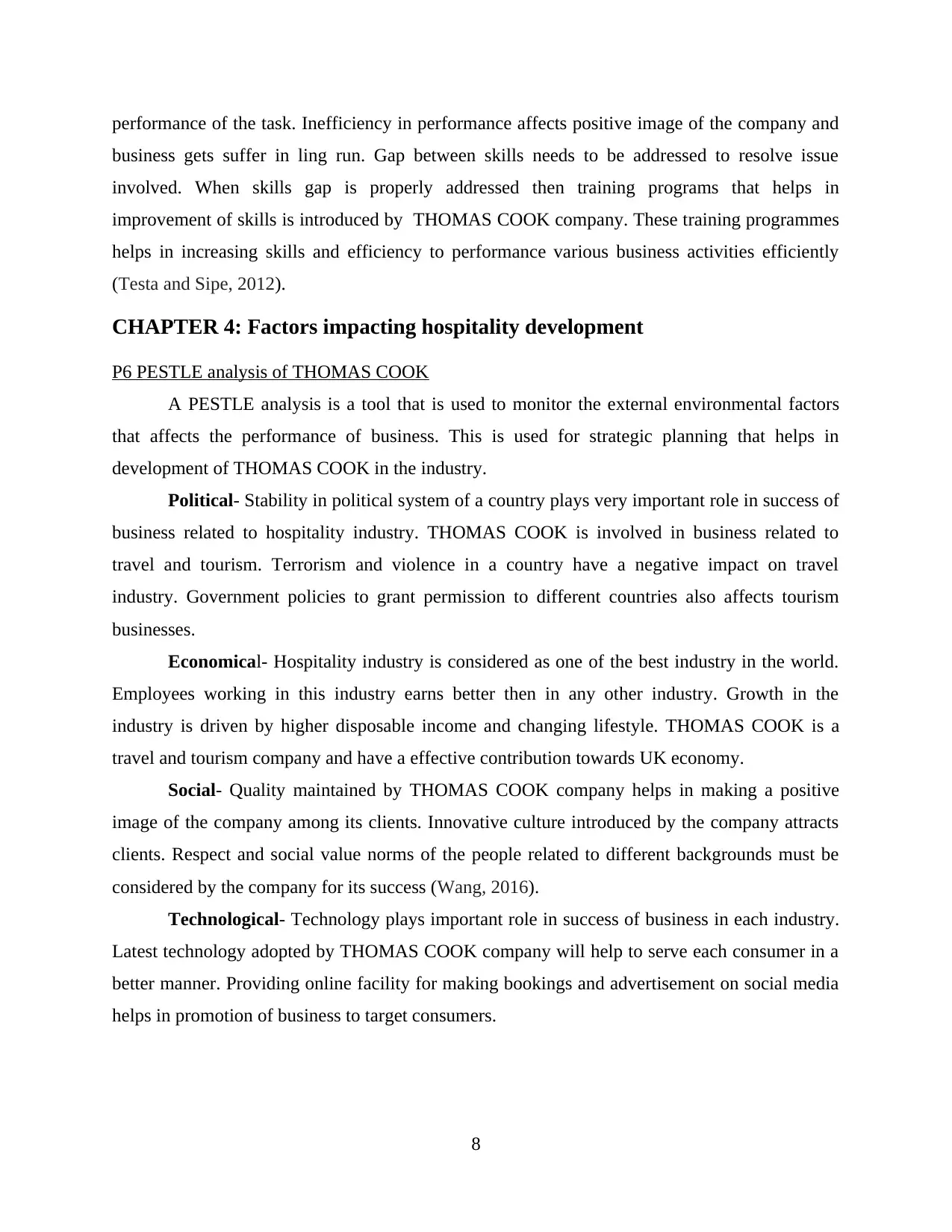
performance of the task. Inefficiency in performance affects positive image of the company and
business gets suffer in ling run. Gap between skills needs to be addressed to resolve issue
involved. When skills gap is properly addressed then training programs that helps in
improvement of skills is introduced by THOMAS COOK company. These training programmes
helps in increasing skills and efficiency to performance various business activities efficiently
(Testa and Sipe, 2012).
CHAPTER 4: Factors impacting hospitality development
P6 PESTLE analysis of THOMAS COOK
A PESTLE analysis is a tool that is used to monitor the external environmental factors
that affects the performance of business. This is used for strategic planning that helps in
development of THOMAS COOK in the industry.
Political- Stability in political system of a country plays very important role in success of
business related to hospitality industry. THOMAS COOK is involved in business related to
travel and tourism. Terrorism and violence in a country have a negative impact on travel
industry. Government policies to grant permission to different countries also affects tourism
businesses.
Economical- Hospitality industry is considered as one of the best industry in the world.
Employees working in this industry earns better then in any other industry. Growth in the
industry is driven by higher disposable income and changing lifestyle. THOMAS COOK is a
travel and tourism company and have a effective contribution towards UK economy.
Social- Quality maintained by THOMAS COOK company helps in making a positive
image of the company among its clients. Innovative culture introduced by the company attracts
clients. Respect and social value norms of the people related to different backgrounds must be
considered by the company for its success (Wang, 2016).
Technological- Technology plays important role in success of business in each industry.
Latest technology adopted by THOMAS COOK company will help to serve each consumer in a
better manner. Providing online facility for making bookings and advertisement on social media
helps in promotion of business to target consumers.
8
business gets suffer in ling run. Gap between skills needs to be addressed to resolve issue
involved. When skills gap is properly addressed then training programs that helps in
improvement of skills is introduced by THOMAS COOK company. These training programmes
helps in increasing skills and efficiency to performance various business activities efficiently
(Testa and Sipe, 2012).
CHAPTER 4: Factors impacting hospitality development
P6 PESTLE analysis of THOMAS COOK
A PESTLE analysis is a tool that is used to monitor the external environmental factors
that affects the performance of business. This is used for strategic planning that helps in
development of THOMAS COOK in the industry.
Political- Stability in political system of a country plays very important role in success of
business related to hospitality industry. THOMAS COOK is involved in business related to
travel and tourism. Terrorism and violence in a country have a negative impact on travel
industry. Government policies to grant permission to different countries also affects tourism
businesses.
Economical- Hospitality industry is considered as one of the best industry in the world.
Employees working in this industry earns better then in any other industry. Growth in the
industry is driven by higher disposable income and changing lifestyle. THOMAS COOK is a
travel and tourism company and have a effective contribution towards UK economy.
Social- Quality maintained by THOMAS COOK company helps in making a positive
image of the company among its clients. Innovative culture introduced by the company attracts
clients. Respect and social value norms of the people related to different backgrounds must be
considered by the company for its success (Wang, 2016).
Technological- Technology plays important role in success of business in each industry.
Latest technology adopted by THOMAS COOK company will help to serve each consumer in a
better manner. Providing online facility for making bookings and advertisement on social media
helps in promotion of business to target consumers.
8
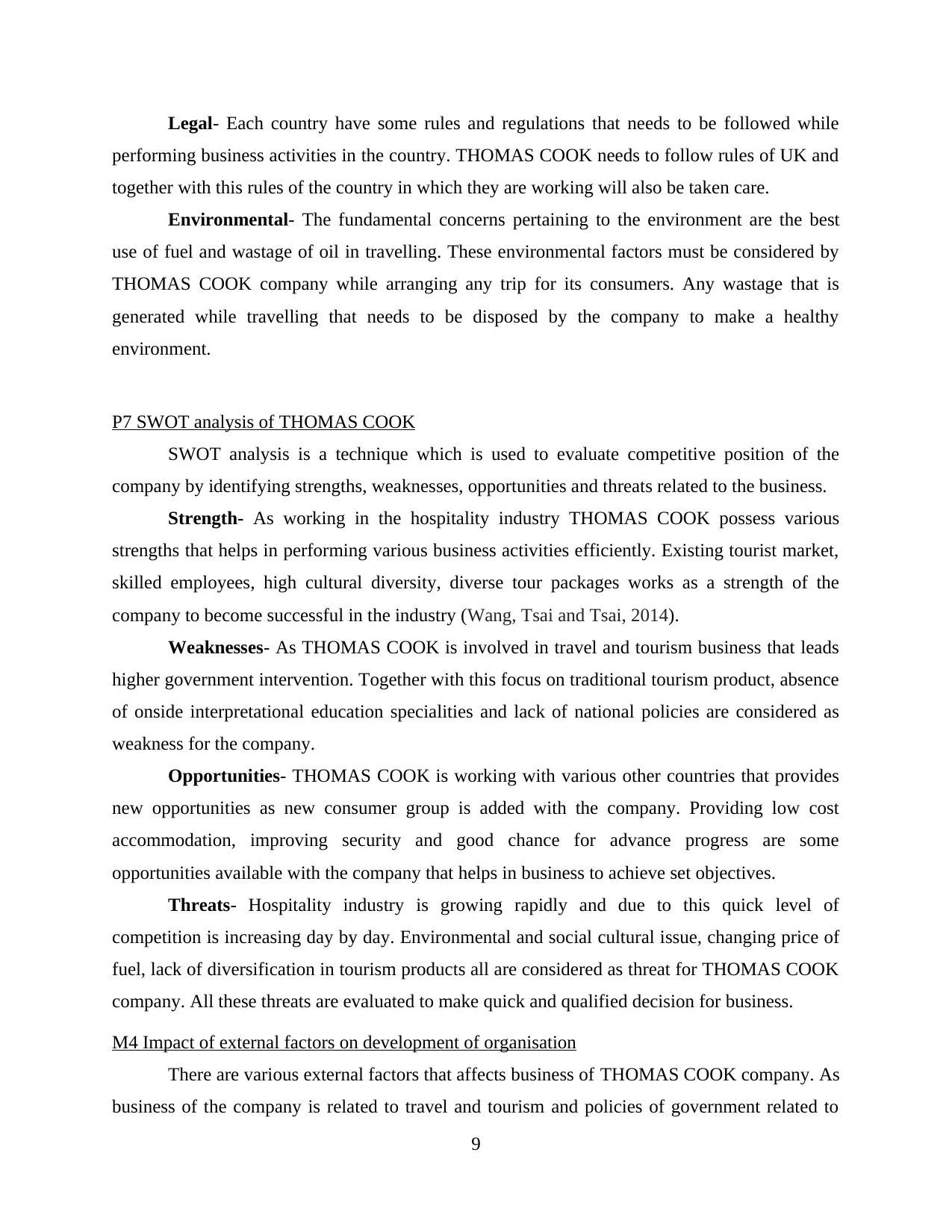
Legal- Each country have some rules and regulations that needs to be followed while
performing business activities in the country. THOMAS COOK needs to follow rules of UK and
together with this rules of the country in which they are working will also be taken care.
Environmental- The fundamental concerns pertaining to the environment are the best
use of fuel and wastage of oil in travelling. These environmental factors must be considered by
THOMAS COOK company while arranging any trip for its consumers. Any wastage that is
generated while travelling that needs to be disposed by the company to make a healthy
environment.
P7 SWOT analysis of THOMAS COOK
SWOT analysis is a technique which is used to evaluate competitive position of the
company by identifying strengths, weaknesses, opportunities and threats related to the business.
Strength- As working in the hospitality industry THOMAS COOK possess various
strengths that helps in performing various business activities efficiently. Existing tourist market,
skilled employees, high cultural diversity, diverse tour packages works as a strength of the
company to become successful in the industry (Wang, Tsai and Tsai, 2014).
Weaknesses- As THOMAS COOK is involved in travel and tourism business that leads
higher government intervention. Together with this focus on traditional tourism product, absence
of onside interpretational education specialities and lack of national policies are considered as
weakness for the company.
Opportunities- THOMAS COOK is working with various other countries that provides
new opportunities as new consumer group is added with the company. Providing low cost
accommodation, improving security and good chance for advance progress are some
opportunities available with the company that helps in business to achieve set objectives.
Threats- Hospitality industry is growing rapidly and due to this quick level of
competition is increasing day by day. Environmental and social cultural issue, changing price of
fuel, lack of diversification in tourism products all are considered as threat for THOMAS COOK
company. All these threats are evaluated to make quick and qualified decision for business.
M4 Impact of external factors on development of organisation
There are various external factors that affects business of THOMAS COOK company. As
business of the company is related to travel and tourism and policies of government related to
9
performing business activities in the country. THOMAS COOK needs to follow rules of UK and
together with this rules of the country in which they are working will also be taken care.
Environmental- The fundamental concerns pertaining to the environment are the best
use of fuel and wastage of oil in travelling. These environmental factors must be considered by
THOMAS COOK company while arranging any trip for its consumers. Any wastage that is
generated while travelling that needs to be disposed by the company to make a healthy
environment.
P7 SWOT analysis of THOMAS COOK
SWOT analysis is a technique which is used to evaluate competitive position of the
company by identifying strengths, weaknesses, opportunities and threats related to the business.
Strength- As working in the hospitality industry THOMAS COOK possess various
strengths that helps in performing various business activities efficiently. Existing tourist market,
skilled employees, high cultural diversity, diverse tour packages works as a strength of the
company to become successful in the industry (Wang, Tsai and Tsai, 2014).
Weaknesses- As THOMAS COOK is involved in travel and tourism business that leads
higher government intervention. Together with this focus on traditional tourism product, absence
of onside interpretational education specialities and lack of national policies are considered as
weakness for the company.
Opportunities- THOMAS COOK is working with various other countries that provides
new opportunities as new consumer group is added with the company. Providing low cost
accommodation, improving security and good chance for advance progress are some
opportunities available with the company that helps in business to achieve set objectives.
Threats- Hospitality industry is growing rapidly and due to this quick level of
competition is increasing day by day. Environmental and social cultural issue, changing price of
fuel, lack of diversification in tourism products all are considered as threat for THOMAS COOK
company. All these threats are evaluated to make quick and qualified decision for business.
M4 Impact of external factors on development of organisation
There are various external factors that affects business of THOMAS COOK company. As
business of the company is related to travel and tourism and policies of government related to
9
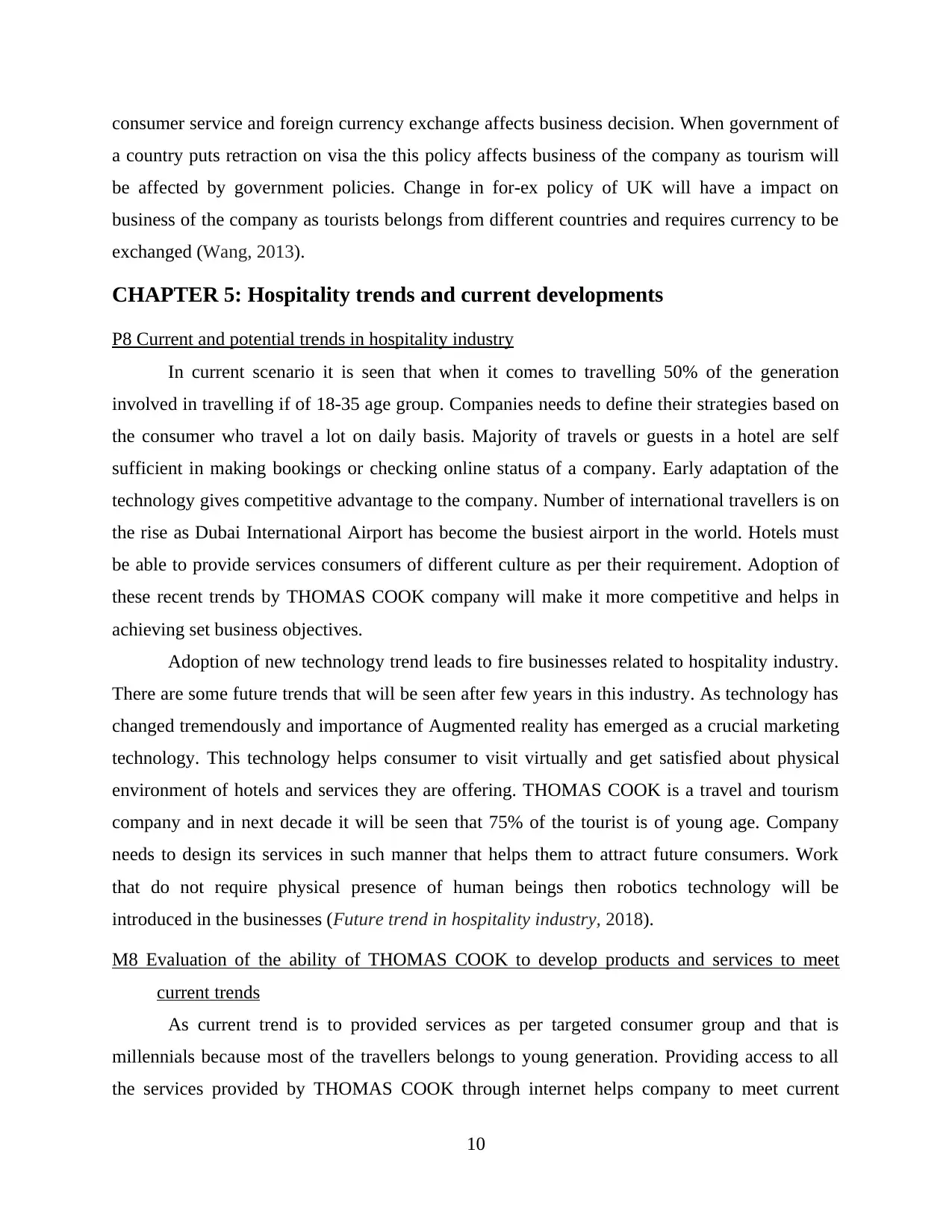
consumer service and foreign currency exchange affects business decision. When government of
a country puts retraction on visa the this policy affects business of the company as tourism will
be affected by government policies. Change in for-ex policy of UK will have a impact on
business of the company as tourists belongs from different countries and requires currency to be
exchanged (Wang, 2013).
CHAPTER 5: Hospitality trends and current developments
P8 Current and potential trends in hospitality industry
In current scenario it is seen that when it comes to travelling 50% of the generation
involved in travelling if of 18-35 age group. Companies needs to define their strategies based on
the consumer who travel a lot on daily basis. Majority of travels or guests in a hotel are self
sufficient in making bookings or checking online status of a company. Early adaptation of the
technology gives competitive advantage to the company. Number of international travellers is on
the rise as Dubai International Airport has become the busiest airport in the world. Hotels must
be able to provide services consumers of different culture as per their requirement. Adoption of
these recent trends by THOMAS COOK company will make it more competitive and helps in
achieving set business objectives.
Adoption of new technology trend leads to fire businesses related to hospitality industry.
There are some future trends that will be seen after few years in this industry. As technology has
changed tremendously and importance of Augmented reality has emerged as a crucial marketing
technology. This technology helps consumer to visit virtually and get satisfied about physical
environment of hotels and services they are offering. THOMAS COOK is a travel and tourism
company and in next decade it will be seen that 75% of the tourist is of young age. Company
needs to design its services in such manner that helps them to attract future consumers. Work
that do not require physical presence of human beings then robotics technology will be
introduced in the businesses (Future trend in hospitality industry, 2018).
M8 Evaluation of the ability of THOMAS COOK to develop products and services to meet
current trends
As current trend is to provided services as per targeted consumer group and that is
millennials because most of the travellers belongs to young generation. Providing access to all
the services provided by THOMAS COOK through internet helps company to meet current
10
a country puts retraction on visa the this policy affects business of the company as tourism will
be affected by government policies. Change in for-ex policy of UK will have a impact on
business of the company as tourists belongs from different countries and requires currency to be
exchanged (Wang, 2013).
CHAPTER 5: Hospitality trends and current developments
P8 Current and potential trends in hospitality industry
In current scenario it is seen that when it comes to travelling 50% of the generation
involved in travelling if of 18-35 age group. Companies needs to define their strategies based on
the consumer who travel a lot on daily basis. Majority of travels or guests in a hotel are self
sufficient in making bookings or checking online status of a company. Early adaptation of the
technology gives competitive advantage to the company. Number of international travellers is on
the rise as Dubai International Airport has become the busiest airport in the world. Hotels must
be able to provide services consumers of different culture as per their requirement. Adoption of
these recent trends by THOMAS COOK company will make it more competitive and helps in
achieving set business objectives.
Adoption of new technology trend leads to fire businesses related to hospitality industry.
There are some future trends that will be seen after few years in this industry. As technology has
changed tremendously and importance of Augmented reality has emerged as a crucial marketing
technology. This technology helps consumer to visit virtually and get satisfied about physical
environment of hotels and services they are offering. THOMAS COOK is a travel and tourism
company and in next decade it will be seen that 75% of the tourist is of young age. Company
needs to design its services in such manner that helps them to attract future consumers. Work
that do not require physical presence of human beings then robotics technology will be
introduced in the businesses (Future trend in hospitality industry, 2018).
M8 Evaluation of the ability of THOMAS COOK to develop products and services to meet
current trends
As current trend is to provided services as per targeted consumer group and that is
millennials because most of the travellers belongs to young generation. Providing access to all
the services provided by THOMAS COOK through internet helps company to meet current
10
Secure Best Marks with AI Grader
Need help grading? Try our AI Grader for instant feedback on your assignments.
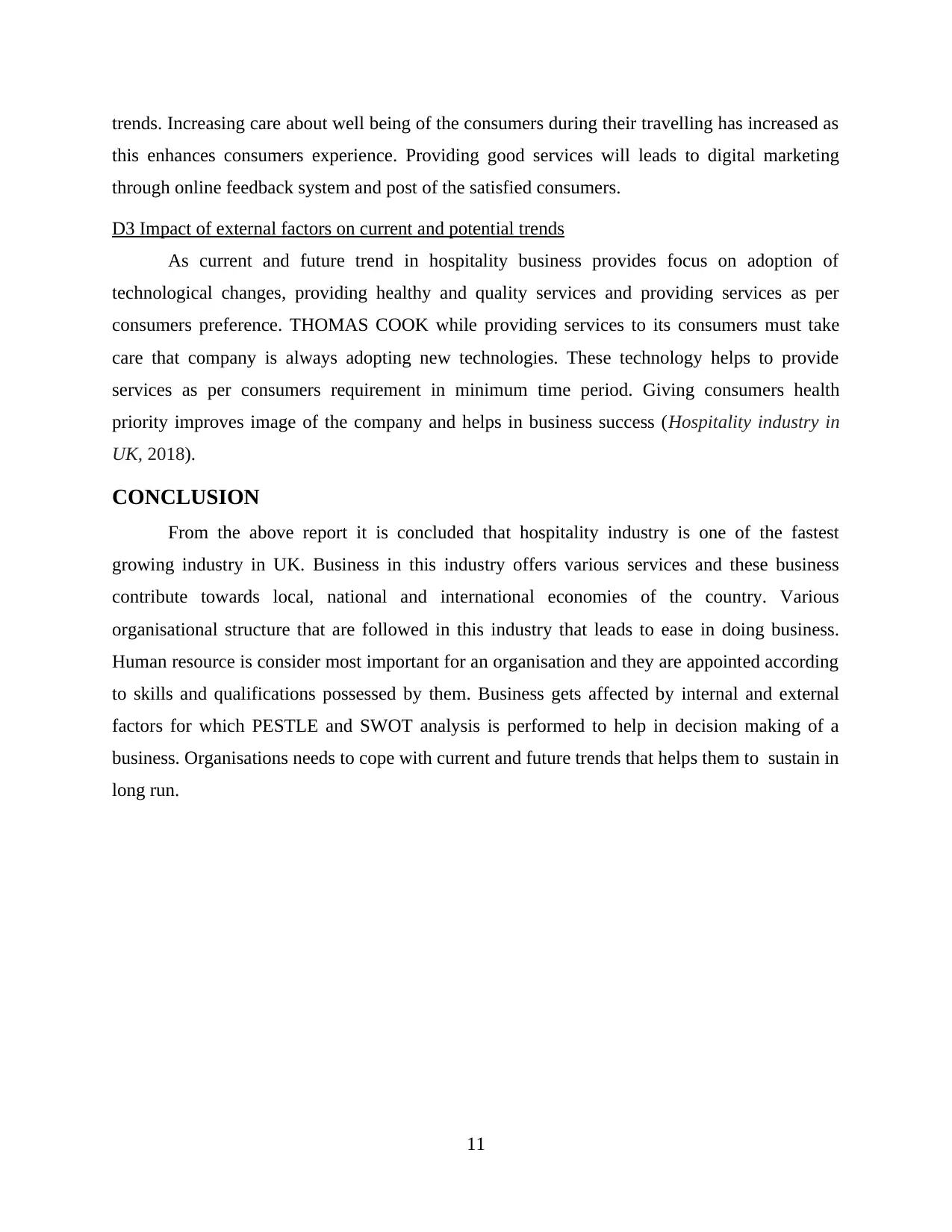
trends. Increasing care about well being of the consumers during their travelling has increased as
this enhances consumers experience. Providing good services will leads to digital marketing
through online feedback system and post of the satisfied consumers.
D3 Impact of external factors on current and potential trends
As current and future trend in hospitality business provides focus on adoption of
technological changes, providing healthy and quality services and providing services as per
consumers preference. THOMAS COOK while providing services to its consumers must take
care that company is always adopting new technologies. These technology helps to provide
services as per consumers requirement in minimum time period. Giving consumers health
priority improves image of the company and helps in business success (Hospitality industry in
UK, 2018).
CONCLUSION
From the above report it is concluded that hospitality industry is one of the fastest
growing industry in UK. Business in this industry offers various services and these business
contribute towards local, national and international economies of the country. Various
organisational structure that are followed in this industry that leads to ease in doing business.
Human resource is consider most important for an organisation and they are appointed according
to skills and qualifications possessed by them. Business gets affected by internal and external
factors for which PESTLE and SWOT analysis is performed to help in decision making of a
business. Organisations needs to cope with current and future trends that helps them to sustain in
long run.
11
this enhances consumers experience. Providing good services will leads to digital marketing
through online feedback system and post of the satisfied consumers.
D3 Impact of external factors on current and potential trends
As current and future trend in hospitality business provides focus on adoption of
technological changes, providing healthy and quality services and providing services as per
consumers preference. THOMAS COOK while providing services to its consumers must take
care that company is always adopting new technologies. These technology helps to provide
services as per consumers requirement in minimum time period. Giving consumers health
priority improves image of the company and helps in business success (Hospitality industry in
UK, 2018).
CONCLUSION
From the above report it is concluded that hospitality industry is one of the fastest
growing industry in UK. Business in this industry offers various services and these business
contribute towards local, national and international economies of the country. Various
organisational structure that are followed in this industry that leads to ease in doing business.
Human resource is consider most important for an organisation and they are appointed according
to skills and qualifications possessed by them. Business gets affected by internal and external
factors for which PESTLE and SWOT analysis is performed to help in decision making of a
business. Organisations needs to cope with current and future trends that helps them to sustain in
long run.
11
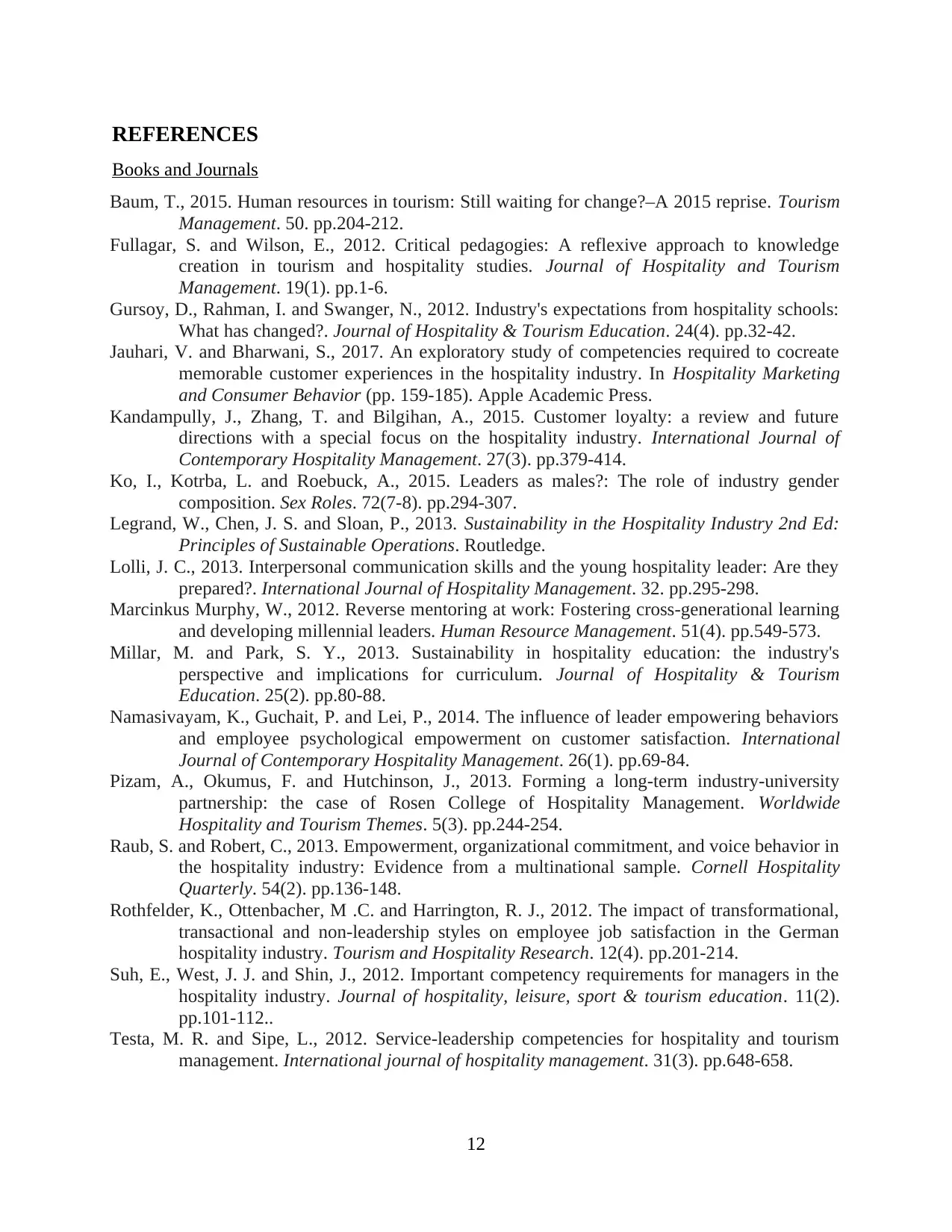
REFERENCES
Books and Journals
Baum, T., 2015. Human resources in tourism: Still waiting for change?–A 2015 reprise. Tourism
Management. 50. pp.204-212.
Fullagar, S. and Wilson, E., 2012. Critical pedagogies: A reflexive approach to knowledge
creation in tourism and hospitality studies. Journal of Hospitality and Tourism
Management. 19(1). pp.1-6.
Gursoy, D., Rahman, I. and Swanger, N., 2012. Industry's expectations from hospitality schools:
What has changed?. Journal of Hospitality & Tourism Education. 24(4). pp.32-42.
Jauhari, V. and Bharwani, S., 2017. An exploratory study of competencies required to cocreate
memorable customer experiences in the hospitality industry. In Hospitality Marketing
and Consumer Behavior (pp. 159-185). Apple Academic Press.
Kandampully, J., Zhang, T. and Bilgihan, A., 2015. Customer loyalty: a review and future
directions with a special focus on the hospitality industry. International Journal of
Contemporary Hospitality Management. 27(3). pp.379-414.
Ko, I., Kotrba, L. and Roebuck, A., 2015. Leaders as males?: The role of industry gender
composition. Sex Roles. 72(7-8). pp.294-307.
Legrand, W., Chen, J. S. and Sloan, P., 2013. Sustainability in the Hospitality Industry 2nd Ed:
Principles of Sustainable Operations. Routledge.
Lolli, J. C., 2013. Interpersonal communication skills and the young hospitality leader: Are they
prepared?. International Journal of Hospitality Management. 32. pp.295-298.
Marcinkus Murphy, W., 2012. Reverse mentoring at work: Fostering cross‐generational learning
and developing millennial leaders. Human Resource Management. 51(4). pp.549-573.
Millar, M. and Park, S. Y., 2013. Sustainability in hospitality education: the industry's
perspective and implications for curriculum. Journal of Hospitality & Tourism
Education. 25(2). pp.80-88.
Namasivayam, K., Guchait, P. and Lei, P., 2014. The influence of leader empowering behaviors
and employee psychological empowerment on customer satisfaction. International
Journal of Contemporary Hospitality Management. 26(1). pp.69-84.
Pizam, A., Okumus, F. and Hutchinson, J., 2013. Forming a long-term industry-university
partnership: the case of Rosen College of Hospitality Management. Worldwide
Hospitality and Tourism Themes. 5(3). pp.244-254.
Raub, S. and Robert, C., 2013. Empowerment, organizational commitment, and voice behavior in
the hospitality industry: Evidence from a multinational sample. Cornell Hospitality
Quarterly. 54(2). pp.136-148.
Rothfelder, K., Ottenbacher, M .C. and Harrington, R. J., 2012. The impact of transformational,
transactional and non-leadership styles on employee job satisfaction in the German
hospitality industry. Tourism and Hospitality Research. 12(4). pp.201-214.
Suh, E., West, J. J. and Shin, J., 2012. Important competency requirements for managers in the
hospitality industry. Journal of hospitality, leisure, sport & tourism education. 11(2).
pp.101-112..
Testa, M. R. and Sipe, L., 2012. Service-leadership competencies for hospitality and tourism
management. International journal of hospitality management. 31(3). pp.648-658.
12
Books and Journals
Baum, T., 2015. Human resources in tourism: Still waiting for change?–A 2015 reprise. Tourism
Management. 50. pp.204-212.
Fullagar, S. and Wilson, E., 2012. Critical pedagogies: A reflexive approach to knowledge
creation in tourism and hospitality studies. Journal of Hospitality and Tourism
Management. 19(1). pp.1-6.
Gursoy, D., Rahman, I. and Swanger, N., 2012. Industry's expectations from hospitality schools:
What has changed?. Journal of Hospitality & Tourism Education. 24(4). pp.32-42.
Jauhari, V. and Bharwani, S., 2017. An exploratory study of competencies required to cocreate
memorable customer experiences in the hospitality industry. In Hospitality Marketing
and Consumer Behavior (pp. 159-185). Apple Academic Press.
Kandampully, J., Zhang, T. and Bilgihan, A., 2015. Customer loyalty: a review and future
directions with a special focus on the hospitality industry. International Journal of
Contemporary Hospitality Management. 27(3). pp.379-414.
Ko, I., Kotrba, L. and Roebuck, A., 2015. Leaders as males?: The role of industry gender
composition. Sex Roles. 72(7-8). pp.294-307.
Legrand, W., Chen, J. S. and Sloan, P., 2013. Sustainability in the Hospitality Industry 2nd Ed:
Principles of Sustainable Operations. Routledge.
Lolli, J. C., 2013. Interpersonal communication skills and the young hospitality leader: Are they
prepared?. International Journal of Hospitality Management. 32. pp.295-298.
Marcinkus Murphy, W., 2012. Reverse mentoring at work: Fostering cross‐generational learning
and developing millennial leaders. Human Resource Management. 51(4). pp.549-573.
Millar, M. and Park, S. Y., 2013. Sustainability in hospitality education: the industry's
perspective and implications for curriculum. Journal of Hospitality & Tourism
Education. 25(2). pp.80-88.
Namasivayam, K., Guchait, P. and Lei, P., 2014. The influence of leader empowering behaviors
and employee psychological empowerment on customer satisfaction. International
Journal of Contemporary Hospitality Management. 26(1). pp.69-84.
Pizam, A., Okumus, F. and Hutchinson, J., 2013. Forming a long-term industry-university
partnership: the case of Rosen College of Hospitality Management. Worldwide
Hospitality and Tourism Themes. 5(3). pp.244-254.
Raub, S. and Robert, C., 2013. Empowerment, organizational commitment, and voice behavior in
the hospitality industry: Evidence from a multinational sample. Cornell Hospitality
Quarterly. 54(2). pp.136-148.
Rothfelder, K., Ottenbacher, M .C. and Harrington, R. J., 2012. The impact of transformational,
transactional and non-leadership styles on employee job satisfaction in the German
hospitality industry. Tourism and Hospitality Research. 12(4). pp.201-214.
Suh, E., West, J. J. and Shin, J., 2012. Important competency requirements for managers in the
hospitality industry. Journal of hospitality, leisure, sport & tourism education. 11(2).
pp.101-112..
Testa, M. R. and Sipe, L., 2012. Service-leadership competencies for hospitality and tourism
management. International journal of hospitality management. 31(3). pp.648-658.
12
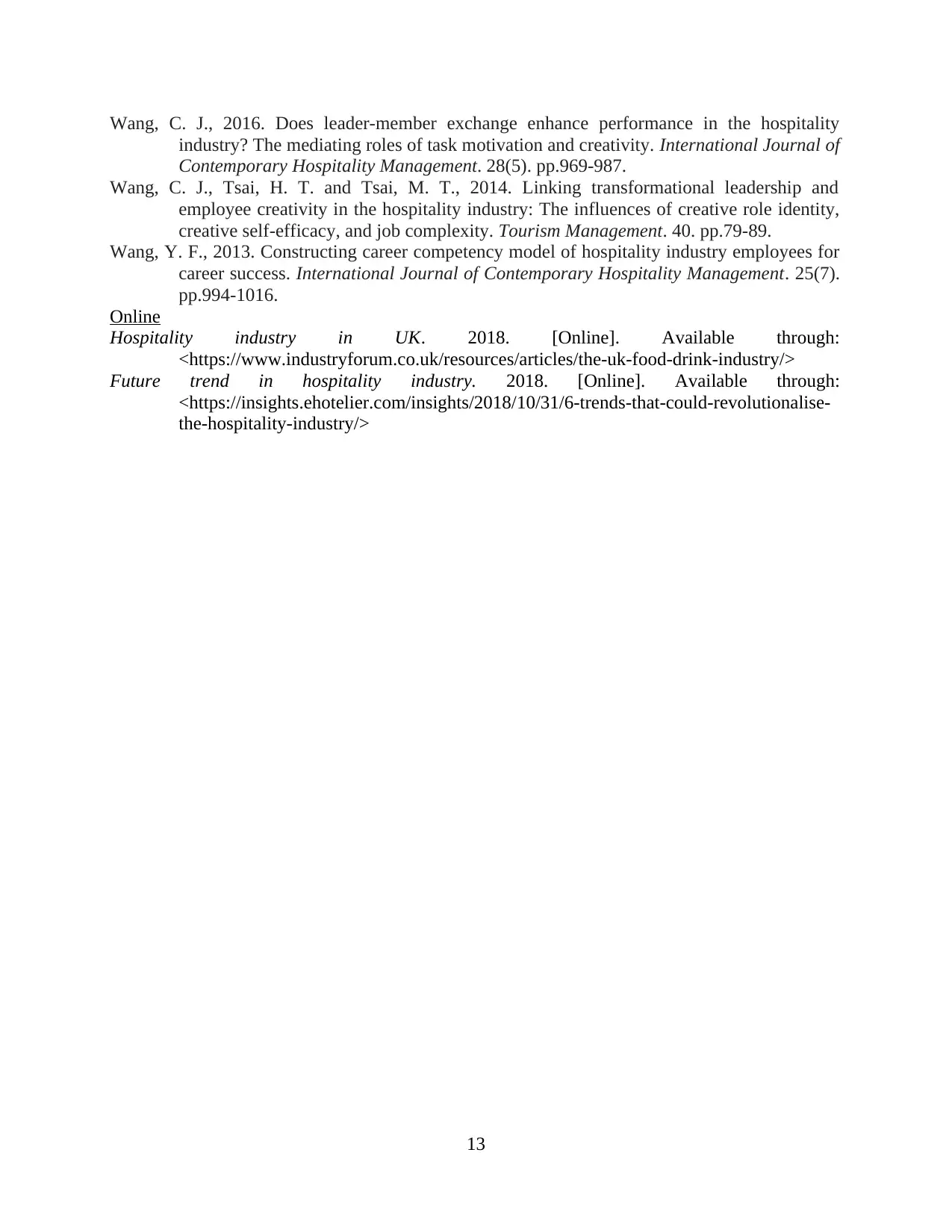
Wang, C. J., 2016. Does leader-member exchange enhance performance in the hospitality
industry? The mediating roles of task motivation and creativity. International Journal of
Contemporary Hospitality Management. 28(5). pp.969-987.
Wang, C. J., Tsai, H. T. and Tsai, M. T., 2014. Linking transformational leadership and
employee creativity in the hospitality industry: The influences of creative role identity,
creative self-efficacy, and job complexity. Tourism Management. 40. pp.79-89.
Wang, Y. F., 2013. Constructing career competency model of hospitality industry employees for
career success. International Journal of Contemporary Hospitality Management. 25(7).
pp.994-1016.
Online
Hospitality industry in UK. 2018. [Online]. Available through:
<https://www.industryforum.co.uk/resources/articles/the-uk-food-drink-industry/>
Future trend in hospitality industry. 2018. [Online]. Available through:
<https://insights.ehotelier.com/insights/2018/10/31/6-trends-that-could-revolutionalise-
the-hospitality-industry/>
13
industry? The mediating roles of task motivation and creativity. International Journal of
Contemporary Hospitality Management. 28(5). pp.969-987.
Wang, C. J., Tsai, H. T. and Tsai, M. T., 2014. Linking transformational leadership and
employee creativity in the hospitality industry: The influences of creative role identity,
creative self-efficacy, and job complexity. Tourism Management. 40. pp.79-89.
Wang, Y. F., 2013. Constructing career competency model of hospitality industry employees for
career success. International Journal of Contemporary Hospitality Management. 25(7).
pp.994-1016.
Online
Hospitality industry in UK. 2018. [Online]. Available through:
<https://www.industryforum.co.uk/resources/articles/the-uk-food-drink-industry/>
Future trend in hospitality industry. 2018. [Online]. Available through:
<https://insights.ehotelier.com/insights/2018/10/31/6-trends-that-could-revolutionalise-
the-hospitality-industry/>
13
1 out of 16
Your All-in-One AI-Powered Toolkit for Academic Success.
+13062052269
info@desklib.com
Available 24*7 on WhatsApp / Email
![[object Object]](/_next/static/media/star-bottom.7253800d.svg)
Unlock your academic potential
© 2024 | Zucol Services PVT LTD | All rights reserved.





